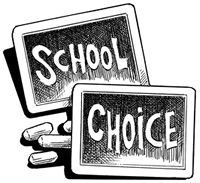School Choice, Yes-But What Kind?

The current debate about school choice has raised the most basic questions about the structure of education since the nineteenth century. But the debate has been relentlessly ahistorical, as if amnesia were a virtue. Many of us seem to have forgotten why America established public schools in the first place, the means we established to make choices about education, and what we have learned not only about the advantages but also about the limitations of choice. When conservatives today speak of "choice," they have in mind choice of schools by individual parents. But choice may take a variety of forms.
Communities make collective choices about education by electing school boards that set educational policy, and by voting school budgets and bonds up or down. Religious congregations may choose to create sectarian schools for their children. Students make individual choices about their education by choosing among the electives offered at their high school. One form of choice may come at the expense of another; under a parental voucher system, the non-parents in the community would be effectively stripped of their capacity to make democratic choices about the schools they pay for.
As conservatives have framed the debate, the question has been, "Are you for or against choice?" But the question ought to be, "What kind of choice are you for?" America's traditions and historical experience provide us some guidance in thinking through this issue.
Read more: The American Prospect



























No comments:
Post a Comment